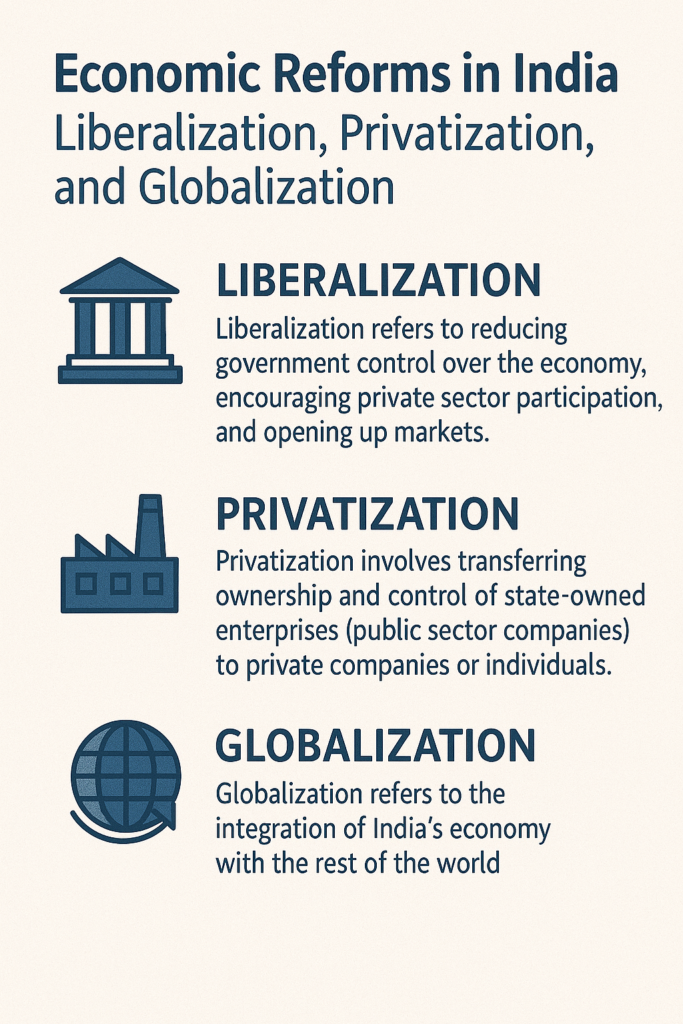What is Foreign Direct Investment (FDI)?
Foreign Direct Investment (FDI) is when a company or individual from one country invests money into a business or assets in another country. Instead of just buying shares in a company, they actually establish a business presence, like building factories or opening offices, in that country.
For example, if a company from the United States invests in setting up a factory in India, this is FDI. It could be in industries like automobiles, electronics, textiles, or pharmaceuticals.

What is India’s Manufacturing Sector?
India’s manufacturing sector includes all industries involved in producing goods, such as:
- Automobiles (cars, bikes)
- Textiles (clothing, fabric)
- Electronics (smartphones, computers)
- Chemicals (fertilizers, plastics)
- Pharmaceuticals (medicines)
This sector plays a huge role in India’s economy, providing jobs and contributing to the country’s exports.
How Does FDI Impact India’s Manufacturing Sector?
FDI can have positive and negative impacts on India’s manufacturing sector. Let’s explore these impacts in detail.
Positive Impacts of FDI in India’s Manufacturing Sector
- Increased Investment and Capital
- When foreign companies invest in India, they bring capital (money). This helps expand and modernize manufacturing facilities, which leads to better products and increased production.
- For example, foreign companies like Honda and Ford have invested in India’s automobile manufacturing, leading to the creation of more cars, jobs, and exports.
- Technology Transfer
- FDI often brings advanced technology and better production techniques. This helps Indian companies improve their productivity and quality. Indian manufacturers can learn from foreign companies and adopt these new technologies.
- For example, when foreign companies invest in sectors like electronics or automobiles, they often bring in cutting-edge machinery or automation techniques that boost the manufacturing process.
- Job Creation
- FDI helps create new jobs in the manufacturing sector. Foreign companies need local workers to build factories, operate machinery, manage production, and more.
- As a result, many Indians find employment opportunities, and the workforce gains skills and training from global companies.
- Boost to Exports
- Many foreign companies in India don’t just make products for the local market; they also produce goods for export to other countries. This helps increase India’s exports and improves the country’s trade balance.
- For example, companies like Samsung and Apple set up manufacturing plants in India to produce products not just for India, but for the entire world.
- Better Infrastructure
- Foreign companies often invest in better infrastructure, such as roads, ports, and factories. This helps improve the overall business environment and makes it easier for Indian companies to produce goods and distribute them.
- For example, setting up manufacturing plants requires good transportation networks, and foreign investment can help build these systems.
Negative Impacts of FDI in India’s Manufacturing Sector
- Dependency on Foreign Companies
- Over-reliance on foreign companies can sometimes make India dependent on external players for certain products or technologies. If these foreign companies decide to leave or reduce investment, it could hurt the Indian economy.
- For instance, if foreign companies like Apple or Ford decide to stop producing in India, it could lead to job losses and disruption in the sector.
- Competition with Local Companies
- Foreign companies may have more advanced technologies and financial resources, which can make it harder for smaller, local businesses to compete. Indian companies may struggle to match the quality or price of products made by foreign companies.
- For example, local textile manufacturers might find it hard to compete with foreign textile giants who bring in more efficient machinery and technology.
- Environmental Concerns
- Some foreign companies may prioritize profit over environmental standards, leading to pollution and overuse of natural resources in India. This can harm the environment if proper regulations are not followed.
- For example, factories that produce chemicals or electronics may create harmful waste, which could affect local communities and the environment.
- Impact on Small-Scale Industries
- FDI often flows into large-scale industries but may bypass smaller, local industries. This could lead to the decline of small businesses, especially in rural areas.
- For example, small-scale handicraft or textile producers might struggle to survive if large foreign textile manufacturers dominate the market.
How FDI Has Helped India’s Manufacturing Sector Grow
India’s manufacturing sector has grown significantly because of FDI. Here are some examples of FDI’s role in different industries:
- Automobile Industry
- Companies like Toyota, Hyundai, and BMW have invested heavily in India’s automobile sector. This has helped create millions of jobs, improved the quality of vehicles, and turned India into a major exporter of cars.
- Electronics Industry
- Foreign companies like Samsung and Foxconn have set up production facilities in India. This has made India a key hub for manufacturing smartphones and other electronic devices, boosting both local sales and exports.
- Pharmaceutical Industry
- India is known as the “pharmacy of the world” because it produces a large portion of the world’s generic medicines. Foreign companies like Novartis and Pfizer have invested in manufacturing units, improving the quality and availability of medicines.
- Textile and Garment Industry
- India is one of the world’s largest producers of textiles and garments. FDI from foreign companies has helped improve production methods, increase export capacity, and create more jobs.
How Has the Indian Government Encouraged FDI?
The Indian government has made several efforts to attract foreign investment:
- Policy Reforms: India has relaxed rules to make it easier for foreign companies to invest. For example, it has increased the percentage of foreign ownership allowed in certain sectors.
- Special Economic Zones (SEZs): These are areas where businesses can get special benefits, like tax exemptions, to encourage foreign investment.
- Make in India Campaign: This campaign encourages foreign companies to manufacture their products in India, helping create jobs and grow the economy.
Conclusion
Foreign Direct Investment (FDI) plays a crucial role in India’s manufacturing sector by bringing in capital, technology, and creating jobs. It helps make the sector more competitive and boosts exports. However, it also brings challenges like competition for local companies and potential environmental issues.
Overall, FDI is a key driver of growth for India’s manufacturing industry, but it must be managed carefully to ensure that it benefits both large and small businesses, workers, and the environment.











